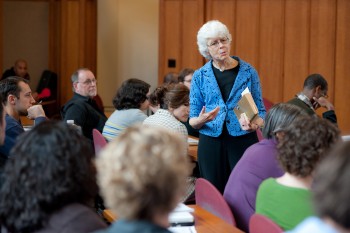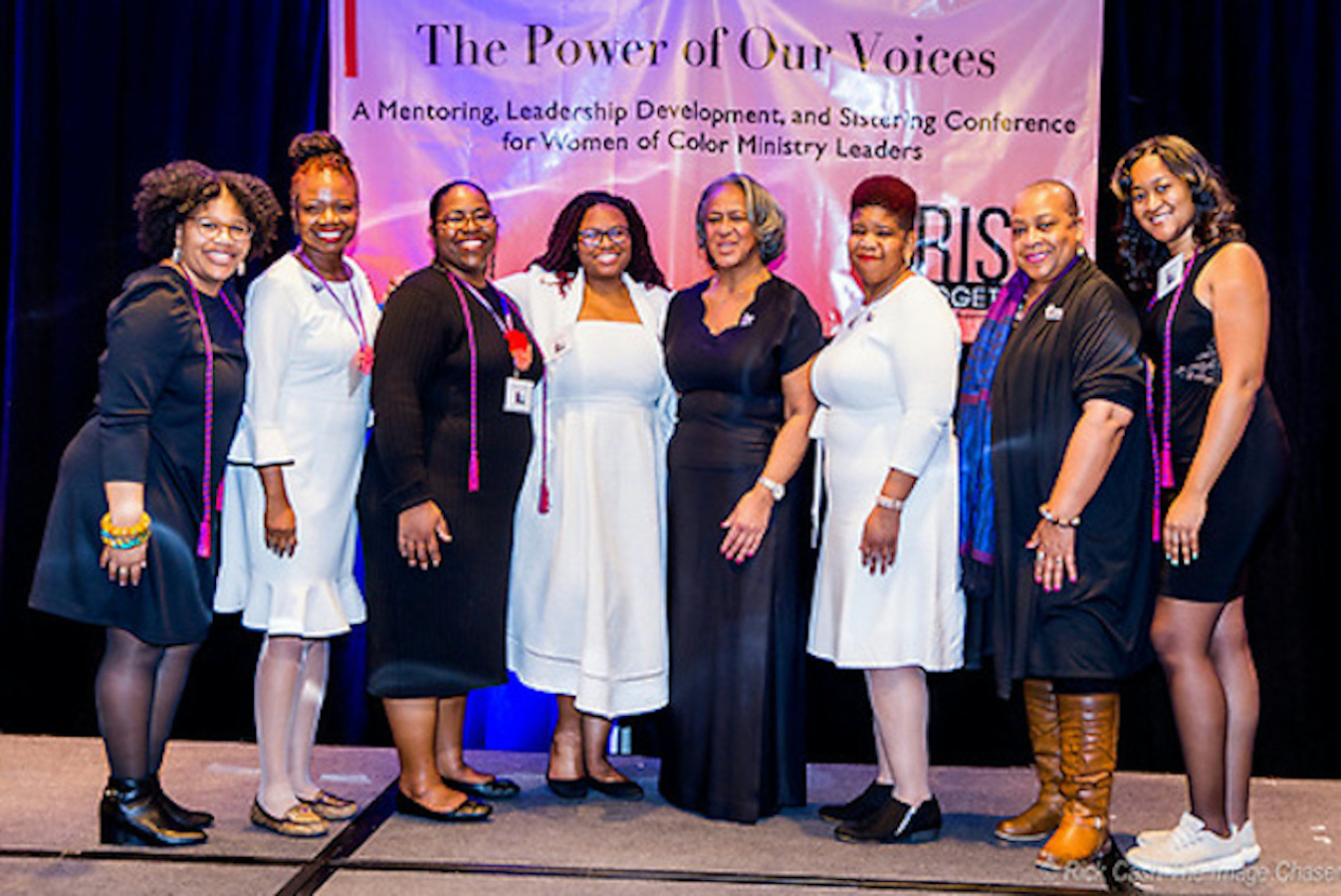Union Theological Seminary offers a variety of courses and programs that go beyond traditional residential, full-time graduate education. Union’s ministry topics and public engagement courses, cohort programs, and part-time and online advanced certificates and degrees provide opportunities for personal and professional growth and lifelong learning. Ranging from a few days to a semester or longer, the courses/programs are open to anyone looking to expand their knowledge, whether their interests are in social justice activism, faith leadership, or simply seeking personal enrichment.
Professional Education and Lifelong Learning at Union allows the public to join our students and the wider Union community in exploring new ideas, skills, and world views. Many of these offerings are available in online or low-residency formats. They also provide valuable opportunities for those considering a Union advanced certificate or degree program to initially engage with Union faculty, students, alumni, and other community members. Union offers four different advanced certificate program in part-time formats (with some online course options) and a fully online, part-time MA in Social Justice program.
Ministry Topics and Public Engagement Courses
Union offers a wide variety of “Supplemental Unit” (SU) courses focused on topics in ministry and issues at the intersection of faith, spirituality, and social justice. These courses are taken by Union students for credit towards degrees, but they are also made available to members of the community on a non-credit basis. They generally meet for 13 hours over multiple days (on Zoom or in person) and feature a variety of guest speakers in addition to a primary instructor. These courses often require pre-reading and incorporate lectures, panel presentations, and group discussions throughout the live class experience.
Upcoming Courses
Topics in Ministry Courses
Topics in Ministry courses provide intensive opportunities to explore theological, spiritual, and professional topics that expand and deepen the Union educational experience. Each course requires a separate registration form and a $150 registration fee. Please check the registration deadline for each course. Current Union students can register for these Fall 20223(and only Fall 2023) courses through the SU 190 course registration form. Registration links below are for members of the community.
The Union of Ati Yoga and Chaplaincy
Dates/Times: October 20 (1-6pm) and October 21 (9am-5pm)
Location: In Person
Instructor: Lama Justin von Bujdoss (he/him)
This one credit class introduces participants to the importance of the development of a ministry that is rooted in open non-judgemental presence as well as a distilled practical introduction to Ati Yoga meditation practice as a supportive technique for chaplains, spiritual caregivers, or anyone who is interested in releasing themselves from the hardness of our biases, assumptions and projections. The Vajrayana Buddhist practice of Ati Yoga or Dzogchen offers simple, direct instructions for resting into ‘pure being’ a state that allows for the natural and authentic way of simply letting everything that we experience arise as it does without the need to judge, ascertain or react.
This program is offered from the Thích Nhất Hạnh Program for Engaged Buddhism.
Icons Workshop
Dates/Times: September 29 (1-6pm) and September 30 (9am-5pm)
Location: In Person
Instructor: Manny Vega
This course will be a workshop format for students to design and create their own personal icons as spiritual expression and devotion. The students will create their own icons over the two-day workshop, with design and construction materials available. The artist/instructor will provide guidance throughout the creative process. The final results would provide insight, planning, craftsmanship, and a completed work, that reflects the student’s spirituality.
The Journey from Diatribe to Dialogue in Christian Muslim Relations
Dates/Times: November 10 (1-6pm) and November 11 (9am-5pm)
Location: In Person – Union Theological Seminary
Instructor: Dr. Mona Siddiqui
Registration
The rich theological history of Christians and Muslims has been one of both polemics and pluralism. This course focuses on the variety of theological themes and approaches which occupied Christians who wrote about Islam and Muslims who wrote on Christianity. The course will begin by looking at the earliest views of Eastern Christians who saw Islam mainly as a Christian heresy to medieval polemics in Latin Christianity as well as Muslim writings refuting Christian claims and creeds, namely the divinity of Jesus. The postcolonial encounters between the two faiths saw the emergence of different approaches which eventually resulted in a gradual shift towards more eirenic dialogue. Since 9/11 there has been a new impetus for mutual engagement and understanding in lay and scholarly settings. While fundamentalisms and evangelical ideologies on both sides still create political and social tensions, students will have a far more nuanced appreciation of why this particular history of the world’s 2 largest faiths still matters.
Public Engagement Courses
Public Engagement Courses, offered in partnership with Union’s Center for Community Engagement and Social Justice, feature Union faculty and distinguished practitioners. These short courses, which are taken by members of the community alongside Union students, are offered in an intensive format, usually over the course of a consecutive Friday and Saturday. Each course requires a separate registration form and a $150 non-refundable registration fee. Please check the registration deadline for each course. Most courses require some pre-reading that may incur an additional cost. Current Union students can register for Fall 2023 (and only Fall 2023) courses through the SU 150 course registration form. Registration links below are for members of the community.
Cohort Programs
Union’s current cohort programs range in length from one semester to two years, providing participants with unique learning, mentoring, community- building, and professional development opportunities. Each has its own admissions requirements, application process, and tuition/fees. Cohort programs are designed for aspiring and current leaders of faith communities as well as those looking to engage more deeply in religious and spiritual exploration. Meetings and other activities are scheduled to fit the busy lives of working professionals. These programs are taken by community members on a non-credit basis.
Encore Transition Program
Encore Transition Program
 The Encore Transition Program at Union Theological Seminary engages a diverse group of 12-15 like-minded 55+ adults in discernment, dialogue, and experience with what an “encore” stage of productive, social-purpose focused adulthood might look like. Encore runs weekly seminar-style sessions to maximize participant engagement. Assigned readings and exercises are designed to provoke discernment, self-reflection, and contemplation.
The Encore Transition Program at Union Theological Seminary engages a diverse group of 12-15 like-minded 55+ adults in discernment, dialogue, and experience with what an “encore” stage of productive, social-purpose focused adulthood might look like. Encore runs weekly seminar-style sessions to maximize participant engagement. Assigned readings and exercises are designed to provoke discernment, self-reflection, and contemplation.
RISE Together Mentorship Network
RISE Together Mentorship Network
 RISE Together at Union Theological Seminary is a female mentorship network that connects women of color seminary students and early to mid-career clergy to experienced women ministers, senior pastors, faculty, and community leaders. Through mentoring relationships, intergenerational and peer support networks, RISE members experience safe spaces for Renewal, Inspiration, Support and Empowerment.
RISE Together at Union Theological Seminary is a female mentorship network that connects women of color seminary students and early to mid-career clergy to experienced women ministers, senior pastors, faculty, and community leaders. Through mentoring relationships, intergenerational and peer support networks, RISE members experience safe spaces for Renewal, Inspiration, Support and Empowerment.
Part-Time + Online Advanced Certificates/Degrees
Union is proud to offer a variety of online and part-time for-credit programs designed and developed specifically with the changing realities of theological education firmly in mind. Online and part-time programs feature coursework taught by Union faculty and carefully designed to meet the intellectual and professional interests and learning needs of online and part-time students. These programs are part of a “stackable credential” approach, allowing students to begin Union coursework as part of a shorter advanced certificate program (earning credits that can later be used towards a master’s degree). Online and part-time programs allow professionals from all walks of life—doctors, journalists, educators, public servants—who are interested in pursuing their deep moral and ethical calling to serve the cause of justice while still continuing in their day-to-day career.
Advanced Certificates
Union’s advanced certificate programs are designed for students who want to apply spiritual and theological learning to practical societal application. The four-course, twelve-credit graduate program can be completed in as little as 9 months (but students have up to 24 months). Courses are taught by Union’s full-time faculty members as well as adjunct faculty and lecturers, taken with other Union students pursuing on-campus and online certificates and degrees. Courses are available on weekdays, weeknights, and, in some cases, weekends. Many courses can be taken online, but students will have a greater selection of courses and be able to complete the degree in the least time by taking some on-campus coursework. Courses are available in fall and spring term, with some offerings in January and summer. Certificates may serve either as a stand-alone credential for those interested in a particular area of focus or as a stackable credential that can later be applied toward a full seminary master’s degree.
MA in Social Justice
Union’s Master of Arts in Social Justice (MASJ) is an online 36-credit master’s degree that can be completed in as little as two years. Working with Union’s dynamic faculty, the MASJ empowers students in the program to reimagine the work of justice. Designed for working professionals, students in the program will be equipped to think critically, intersectionally, and creatively about human and planetary flourishing and the ongoing pursuit of a more just society and equitable world. The program emphasizes social justice’s religious, spiritual, and theological roots and offers a wide range of coursework in racial and ethnic justice, gender and sexuality justice, and eco-justice. In keeping with Union’s unique approach to theological education, it underlines the importance of interreligious engagement with diverse religious traditions.



